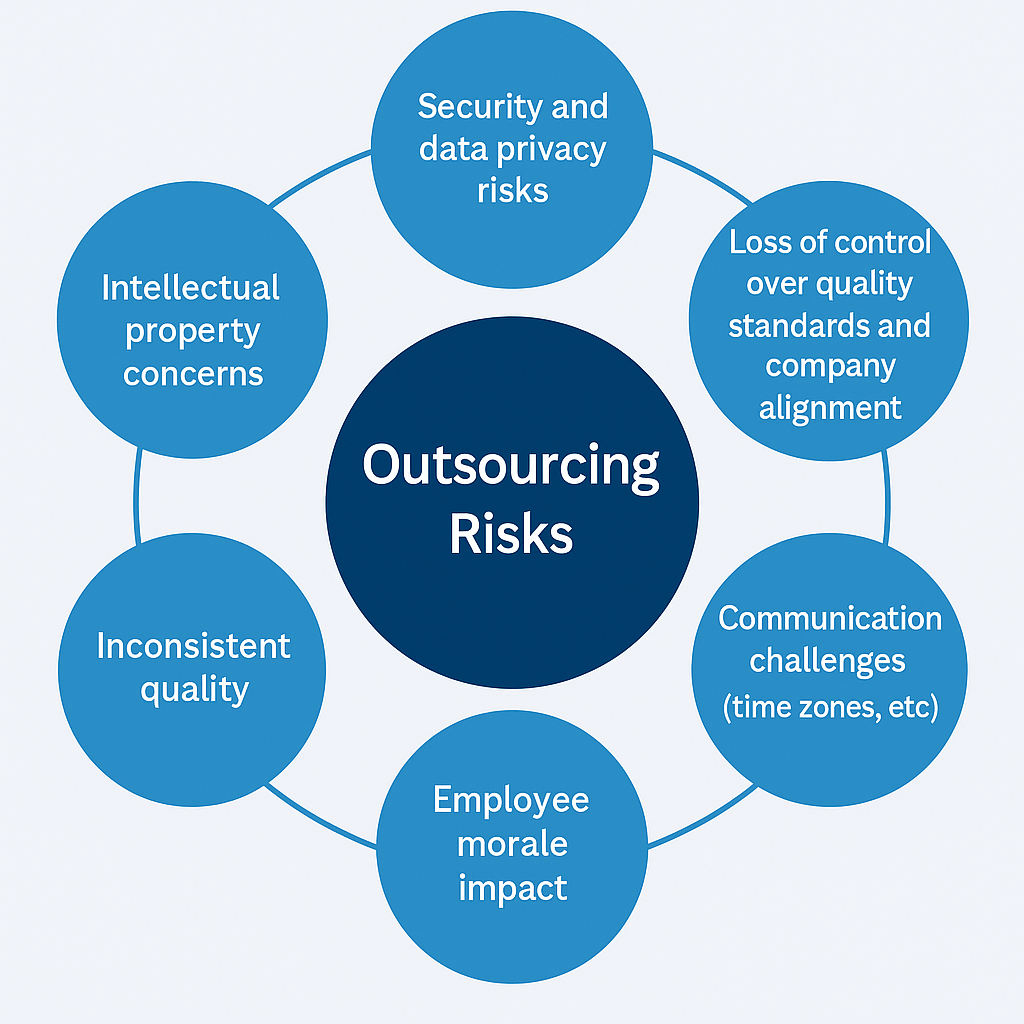We are in a global business world where economies are interdependent and competencies surpass borders. We are definitely in a situation where you should look beyond the US for the best talent. While outsourcing is often praised for its cost-saving benefits, it also has some major disadvantages, such as leading to hidden costs and quality issues. A global CIO survey by Compuware revealed that while cost reduction is a primary driver for outsourcing services, 67% of respondents reported dissatisfaction with the quality of new applications or services provided by their outsourcer, citing challenges such as a widening in-house skills gap, difficulties with knowledge transfer, and staff turnover within outsourcing organizations.
When deciding between outsourcing and in-house hiring, as a leader, you should weigh the trade-offs:
- What do you gain in efficiency?
- What might you lose in cohesion or quality?
We’re not gonna repeat the usual hype about its advantages. Instead, we’re focusing on what’s often left out: the hidden downsides that can harm your business in the long run. To clarify, we will discuss the disadvantages of outsourcing and why they exist. This way, you will understand what can be easily missed when you get an outsourced solution and make an informed decision.
What is Outsourcing?
Outsourcing is a business practice where a company hires another company to perform a task, process, operation, or even a complete service. Outsourcing sometimes involves transferring employees, assets, and/or responsibilities from one firm to another.
We’ve all heard of companies outsourcing call centers, IT services, manufacturing, and marketing. The list is long, but the goal is clear: take advantage of another company’s resources. In other words, instead of hiring new, internal employees to do tasks and projects, you hire an external employee from an outsourcing company to do it for you. It’s a simple solution, with some possible downsides, as we shall also see.
In a Forbes article, marketing specialist Erik Huberman talks about the importance of focusing on what you do well: “When launching a business, it’s critical to do what you are good at; sticking with your core competency is an absolute must.” For areas outside your core competencies, you may choose to bring in extra help.
What are the Main Disadvantages of Outsourcing?

Global outsourcing comes with significant challenges, including loss of control, security risks, communication barriers, and tarnishing a company’s culture.
Here are the biggest drawbacks of global outsourcing:
- Security and data privacy risks – sharing sensitive information with external providers
- Loss of control over quality standards and company alignment
- Communication challenges from time zones, language barriers, and cultural differences
- Hidden costs from contract management, quality control, and potential rework
- Employee morale impact when staff view outsourcing as job threats
- Inconsistent quality, especially for complex, specialized tasks
- Intellectual property concerns with unauthorized use or disclosure risks
1. Outsourcing hurts cultural fit
As you grow your company, you’re not only looking for skilled people, you’re looking for employees who are a cultural fit for your organization. You want your organization to grow based on shared values and ways of doing business. Harvard Business Review research confirms this approach – companies with strong shared cultures see higher employee engagement, lower turnover, better customer satisfaction, and more effective collaboration to achieve goals.
When you’re outsourcing instead of bringing in new employees, you have less of an opportunity to ensure that your new employees fit with your company’s philosophy. These employees may have the skills that you need, but since they may not be with your company for the long term, they may not hold the same commitment to your company’s vision. McKinsey & Company found that companies valuing cultural fit see 2.5 times more success than those that don’t.
2. Outsourcing Brings Quality Control Issues
With outsourced work, you will experience work quality issues because vendor staff lack product knowledge or because the employees do not follow the same standards. The reasons can be many, but the reality is when you decide to outsource personnel, you lose direct control over daily operations. A global CIO survey found that 67% of companies were unhappy with the quality of work from their outsourcing providers. IT teams spend an average of 10 days fixing performance issues—many of which stem from outsourced development. These setbacks don’t just drain your internal resources; they disrupt timelines and frustrate end-users.
2025 CIO Pulse: 67 % of enterprises fixed critical bugs caused by outsourced code in the past year, adding 10 days of unplanned work on average.
3. Communication is an Issue and Can Delay Projects
Successful projects need great communication.
Outsourcing, by definition, involves two organizations. All organizations go through communication challenges, especially when located across different time zones and countries. In 2022, 21% of companies in a survey answered that communication issues are the biggest problem with an outsourcing team.
Improper communications can result in missed requirements, confusion over timelines, and redundant work. Several cultures have problems saying no or believe that providing proactive feedback is not polite. You also have to deal with time zone challenges if one team resides in New York and the other team of developers sits in Bangalore.
It is not uncommon for companies to invest in sophisticated project management software and collaboration tools or to even send a manager on a special mission to the outsourcing destination, just to make sure all productivity is not lost due to miscommunication, yet it will still never compare with maintaining everything in-house, where employees can meet on a daily basis and chat casually.
4. Financial and Quality Risks
Hidden costs can arise from contract management, quality control, and rework if tasks don’t meet expectations, along with financial risks from fluctuating exchange rates and regulatory changes.
Quality inconsistency is particularly problematic for complex or specialized tasks.
5. Impact on Your Staff Morale
Another extremely popular complaint about outsourcing is the negative impact on the morale of existing employees. If employees see work, potentially even their work, being sent to an outsider, it tends to scare them or make them upset. As a result, morale and productivity go down. It has already been mentioned that mass outsourcing can severely damage the morale of employees.
Even when existing employees are not fired and are working side by side with staff on contract, they sometimes feel, rightly so, that they are the ones who have to train and fix the mess of the new contractor causing severe tensions. Furthermore, most employees are attached to their company’s culture and proud of their product; if they feel that the outsourcing company will change that culture or affect the work quality of their product, it will easily affect their morale. And research proves it where in house employees that had some services outsourced have shown less commitment and increased frustration.
My advice is that no manager should make an outsourcing decision without considering staff morale and discussing it with each department manager. Over time, an in-house team has the opportunity to grow into their roles, learn from mistakes, and develop a deep understanding of your customer base. According to Entrepreneur magazine, “some tasks make sense to outsource initially and bring in-house later,” and I couldn’t agree more.
6. You Lose Control Over your Team
Another of disadvantage of outsourcing recruitment is that you lose control of your team. Not control in a micromanager way, but control over how things are evolving in your team and project. As the business manager, you may not understand the depth of each of your employees’ specialties. Still, you do need to be able to ask questions and understand the overall picture of what that employee brings to your company.
If you’re outsourcing your technical help, you aren’t necessarily as deeply connected to your tech support team. When you want your finger on the pulse of all aspects of your business, you need to be able to have long conversations, ask questions, and get to know each part of your business.
7. There’s a Higher Risk
While your business is welcoming, there’s probably some information that you’d like to keep to yourself. Whether this is financial information or product-specific technology, every business has its internal workings that don’t need to be made public.
When you’re outsourcing, you open your business to others, and you need to determine how comfortable you are with people who aren’t employees accessing your company’s data. A 2024 third-party risk management study revealed that 74% of organizations view vendor-related data breaches as their primary concern. This worry is justified, as 61% of companies experienced a data breach through a third party in the past year alone—a 49% increase from the previous year, showing the growing threat of third-party security incidents.
Also, keep in mind that you also have a higher risk when you outsource when it comes to results and the outcome. You can’t fully control the processes and the way your external “employees” work, and therefore, you have no control over what the result would be like. In some industries, this happens more than in others.
One of the main disadvantages of outsourcing IT talent is that you can’t control the entire development process as you would if it were your internal team. And therefore if developers choose to work with other methodologies or make other processes, it will be harder to establish control because they are not your employees.
Is remote staffing better than global outsourcing in 2025?
With remote staffing, you gain the advantage of a flexible, inexpensive workforce without losing the strategic advantage of losing control and culture. In fact, the difference between remote staffing and outsourcing is that when you outsource, you lose control of the workforce and management process to a third-party company.
It’s important to understand that when you search for new employees, you want people who are not only exposed to but also understand your company’s values. This is equally true when you try to identify the best solution for your needs. The reason why I mention this is that I have seen leaders inaccurately use the term outsourcing to describe their solutions.
Here is a video where I clarify this common mistake:
Here are some of the reasons why remote staffing services might be a better fit for you:
1. More Control
When you hire a full-time remote employee, you directly control your employee’s tasks, priorities, and timelines. You don’t need to filter everything through different managers that might misinterpret your requests and delay the work.
2. Integration with Your Management Process
A remote employee works within your internal management process and even follows best practices. He/she also works with the same tools as the rest of the staff.
3. Reduces Employee Turnover
Since the remote staff works directly for you, they are more loyal, happier, and feel a greater sense of ownership. This translates to less chance of staff leaving than in a typical outsourced environment where the employee works on several accounts.
4. Increases Productivity
One of the significant advantages of remote staffing is that it maximizes productivity. A remote employee is part of your organization and can be trained and evaluated for the long term.
5. Consistency in Company Culture
A remote employee follows your company’s values, ethics, and rules of conduct.
Remote staff interact better with local staff, have a better understanding of the company’s wants and needs, and simply blend in with the team.
Conclusion
Although outsourcing can provide valuable benefits—such as cost savings and access to specialized expertise—it also comes with huge drawbacks that you must carefully consider. A better solution can ber emote staffing. As mentioned previously, you will still control your processes and have a full-time remote employee who works within your management processes and around your company culture. What can be better? And if you are looking for a great remote staffing solution, well, you’ve picked up the right blog. We provide remote tech staff. We focus on bringing the best people to you from around the world, and we can help your business overcome the disadvantages of outsourcing while maintaining the advantages of a global workforce. Contact us today for more information about how we can help your business grow. Feel free to contact us when you are ready.






